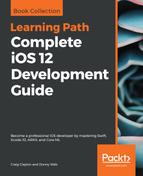In the next section about Universal Links, you will learn what Universal Links are and how you should implement them in your application. Enabling Universal Links benefits your Spotlight search ranking and visibility because Spotlight can associate web resources that Apple's bots can crawl with the items you add to the Spotlight index. To associate Universal Links and your locally indexed items with each other, you should set the contentUrl that matches the web resource for a local item on your search attributes objects.
Doing so allows Apple to display search results for your app as public, and it can even show your Universal Links in Safari's search results. This means that it will be even easier for your users to discover and use your app. More importantly, if you associate a contentUrl with an indexed item, your app is also shown to people who don't have your app installed. That fact alone should persuade you to make sure that your app has online resources that mirror the public content in your app.
Once you've decided to add content URLs to your content, it's essential that you add proper, structured metadata to your web pages. If your web page has well-formatted metadata available, Spotlight will index your app's contents even if you don't manually add it. This is because Apple continuously crawls the marketing and support URLs you advertise within the App Store.
For Apple's bot to be able to discover the URLs your app can handle, it checks whether there is a Smart App Banner implemented on your web page. The Smart App Banner is visible to people who visit your website. If they already have your app installed, the banner will prompt the user to view this content in your app. If you've added a URL to the banner that your app can handle, Apple's bot can discover this link and associates it with your app.
You should always make sure that you add useful metadata to your web content. When you manually index content, you can set properties on the indexed item's attributes set to represent your data. On the web, you can't create an attribute set, so you need to embed the metadata in your page's HTML markup. If your web page contains Open Graph metadata, Apple's bots will understand how to read that metadata. Even though Open Graph metadata is a great start, Apple recommends that you implement richer and more fine-grained data for your websites.
To do this, it's recommended that you implement metadata as specified in the schema.org standards. These standards provide definitions for a wide range of different entities. For instance, you can express a product rating, pricing, or a business address through schema.org definitions of these entities.
If you've implemented metadata for your app, or if you want to make sure that Spotlight can index your contents, you can use Apple's verification tools for searching. Go to https://search.developer.apple.com to paste in your website's URL and verify that everything can be indexed as you expected.
Having a complete set of metadata positively impacts your rating. An obvious reason is that it's better because more information means more matches for a search query. However, a different reason is that, if a user sees a search result that provides a lot of information at a glance, it's easier for them to decide whether a specific result is relevant to them.
This quick assessment of relevancy up front makes sure that whenever a user selects a result for your app, they know for sure that they want to interact with that item. Apple measures this form of engagement to ensure that results that are tapped often and are used longer are pushed to the top.
A topic that is directly related to this is the concept of keyword stuffing. When optimizing for a search, it can be tempting to stuff a lot of keywords into your contents. Doing this will not positively impact your ratings in Spotlight. The reasoning behind this is that keyword-stuffed results will often look like spam. The preview won't be a coherent preview of contents, but it will look as if somebody tried to put as many relevant words together as they could. A result that looks poor is less likely to be tapped by a user and will be pushed down in the rankings eventually.
If users do end up tapping a keyword-stuffed item, it's unlikely that they will find what they were looking for. Often, this means that the user exits your app after just a couple of seconds, and this negatively impacts your result rating.
In other words, add as much metadata as you reasonably can, but ensure that any data you add is relevant, authentic, and exists in your app. A good preview in Spotlight and a matching experience in your app is the best way to for apps to rank highly in Spotlight.
